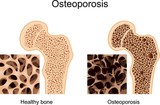Bone Density
Measuring your bone’s strength can be done with a simple, quick and accurate test called Bone Density or DEXA. Osteoporosis is a disease where a general loss of calcium and bony changes result in an overall weakening of the bone. This can make the bone more fragile and more likely to break. The bones can become so weakened that even minor stress or movement can cause a fracture. If identified early, the process of bony loss can be slowed or arrested.
Osteoporosis is the most common cause of fracture in older people. Until a fracture occurs, there are no symptoms. The Bone Density exam can measure how much density is present in a bone and compare it to a “normal” value. The results can be followed in time to see whether a treatment is working. It can also be used in patients who have conditions that can make bone loss more common or are taking medications that can decrease a bone’s strength.
Bone Density scanning, also called dual energy x ray absorptiometry (DEXA) is an enhanced form of x ray that is used to measure bone loss.
This exam is a simple, painless, non-invasive procedure. You will be asked to lie perfectly still on a table while a movable detector passes over the hip and spine. Our Hologic Horizon DXA system will make one pass to obtain the information with very small amount of radiation and minimal exam time.


What is Osteoporosis and why should I be concerned?
Osteoporosis is a debilitating disease that reduces the strength of your bones, causing them to become brittle and prone to fractures. A women’s risk of hip fracture alone is equal to the combined risk of developing breast, uterine and ovarian cancer.
Who is at risk?
Women who are post-menopausal are at the highest risk of developing osteoporosis. Men or women with the presence of any one of these factors can add to your risk:
- Age
- Caucasian, Asian, or Hispanic/Latino descent
- Thin or small build
- Previous fracture
- Family history of osteoporosis
- Early menopause (before age 45)
- Low sex hormones (estrogen in women/testosterone and estrogen in men)
- Smoking
- Inactive lifestyle
- Certain medications (including steroids and thyroid hormones)
- Alcohol abuse
- Diet (low calcium & vitamin D intake/excessive protein, sodium & caffeine intake)
- Certain diseases such as rheumatoid arthritis, gastrointestinal disease & anorexia
- Organ transplant recipients
Experts believe that the presence of any of these factors increases your risk of osteoporosis.
If none of these factors apply, you may still be at risk. Only a bone mineral density test can provide the information your doctor needs to diagnose your condition.


